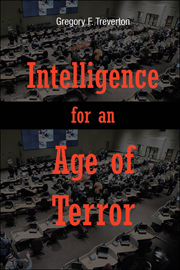Book contents
- Frontmatter
- Contents
- Preface
- Acronyms
- Intelligence for an Age of Terror
- 1 Introduction
- 2 The Changed Target
- 3 The Cold War Legacy
- 4 The Imperative of Change
- 5 The Agenda Ahead
- 6 The Special Challenge of Analysis
- 7 Many Customers, Too Many Secrets
- 8 Covert Action: Forward to the Past?
- 9 Rebuilding the Social Contract
- Notes
- Index
6 - The Special Challenge of Analysis
Published online by Cambridge University Press: 05 August 2012
- Frontmatter
- Contents
- Preface
- Acronyms
- Intelligence for an Age of Terror
- 1 Introduction
- 2 The Changed Target
- 3 The Cold War Legacy
- 4 The Imperative of Change
- 5 The Agenda Ahead
- 6 The Special Challenge of Analysis
- 7 Many Customers, Too Many Secrets
- 8 Covert Action: Forward to the Past?
- 9 Rebuilding the Social Contract
- Notes
- Index
Summary
If the season of analysis as the object of blue-ribbon panel postmortems was unusual, so was the scathing language used by both the WMD Commission and the Senate Select Committee in describing analysis in the run-up to the Iraq war. One critical part of the agenda for reshaping intelligence is analysis, and the need is dramatic. Current and future threats to the United States such as terrorism are global and adaptive, blurring distinctions among crime, terrorism, and war. Analysts of the future will need to think more like homicide detectives, trying to see patterns amid incomplete information. Most important, given the asymmetric nature of the threat, future analysis becomes net assessment, where understanding “blue” – what the United States is doing – is as critical as understanding “red,” U.S. foes. However, this runs directly against the powerful norm in U.S. foreign intelligence: “Thou shalt not assess America or Americans.”
In these circumstances, there are no easy solutions to improving analysis; legislation or reorganization or exhortation cannot produce more creativity. The shortcomings run deep into organizational culture; for instance, most intelligence analysis in the U.S. government has made little use of either machines or formal methods. Thus, there is no substitute for a rich variety of pilot projects and experiments, many of which involve dramatic departures from current practice. For instance, psychologists tell us that harried people are not likely to be creative; creativity requires having some reflective “down” time.
- Type
- Chapter
- Information
- Intelligence for an Age of Terror , pp. 134 - 167Publisher: Cambridge University PressPrint publication year: 2009



